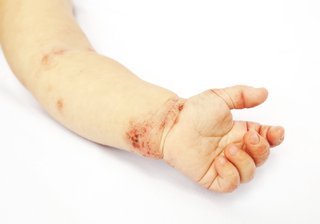How to Get Rid of Baby Face Knees
Eczema is when skin becomes inflamed, itchy, dry, red and cracked.
Symptoms
The main symptom is itching. A severe itch can also cause disturbed sleep and irritability.
Your child's skin may look red, dry, cracked and sore. They may also have scratch marks and bleeding. Their skin may appear wet if it's very irritated or infected.
Eczema is most commonly found on the face and in the creases of necks, elbow joints and the backs of knees. But any area of your child's skin can be affected.

Treatment
Take your child to the GP if you think they have eczema.
Your GP can diagnose eczema by looking at the skin. Blood and skin tests are not usually needed. Your GP may dab your child's skin with a swab (like a cotton bud) to see if the eczema is infected. This should not cause your child any pain.
Your GP may prescribe:
- lotions, creams or ointments to moisturise your child's skin (emollients) - children who have eczema need their skin moisturised at least 2 to 3 times every day
- steroid creams - to help reduce itching and redness
- antihistamines - to reduce itchiness so that your child can sleep
- cotton bandages - to stop creams rubbing off and prevent your child from scratching
- antibiotics – if your child's eczema becomes infected
Emollients and fire safety
Lotions, creams or ointments used to moisturise your child's skin are also known as emollients.
Emollients are very effective at treating chronic dry skin conditions, such as eczema.
But it is important to be aware of the fire risk linked with them.
Emollients won't cause a fire on their own. But if there is a build-up of emollient residue on clothing and bedding, this can quicken the speed of a fire.
Do not smoke near your baby or allow them near naked flames:
- while they are wearing emollient
- if they are wearing clothes or bandages that may have emollient on them
There is a fire risk with all paraffin-containing emollients. There may also even be a fire risk with paraffin-free emollients. There might also be a fire risk with other products that you put on skin over large body areas for more than a few days.
Washing clothing or fabric at a high temperature may reduce emollient build-up. But it might not totally remove it.
Important
Remember, your baby's treatment is important. Emollients are a very effective treatment for dry skin conditions. Making sure your baby is never around naked flames or lit cigarettes will keep them safe while they get treatment.
What you can do
You can help reduce your child's discomfort by:
- keeping their fingernails short to reduce the damage to their skin from scratching
- washing them with aqueous cream instead of soap - ask your pharmacist about aqueous creams and always follow the instructions on the product
- using non-biological detergent and a double rinse cycle when washing their clothes or bedding
- avoiding herbal, 'natural' or alternative creams - these can make eczema worse, as they may contain bacteria or high doses of steroids
- rinsing and drying them well after swimming
- dressing them in cool, breathable fabrics like cotton
- keeping them away from anyone with a cold sore - as the cold sore virus can cause eczema to become infected
- using extra moisturiser on areas your child scratches a lot
- avoiding anything you know that causes your child's eczema to get worse
Around 6 out of 10 children with eczema will grow out of it by the time they're teenagers.
Causes
The most common type of eczema is 'atopic eczema'. People with atopic conditions are sensitive to things that cause allergies. Eczema can also be linked to other atopic conditions like asthma, hay fever and food allergies. There's no cure for atopic eczema, but it can be treated.
Eczema can also be caused by a problem with how the skin works. The skin has a barrier that keeps moisture in and germs out. If someone has eczema, their skin barrier does not work very well. This means their skin can become dry and bacteria can get in.
Eczema triggers
Some things can cause your child's eczema to get worse, or 'flare up'. These include:
- being too hot
- wearing wool
- pets
- strong or scented soaps and detergents
- teething
- getting a virus
- stress
- dust
Very rarely, food allergies can trigger eczema. Ask your GP to refer you to an allergy specialist if you think your child has a food allergy. Keep a food diary to see if there's an obvious link between specific foods and eczema getting worse.
There's no benefit to avoiding foods associated with allergies if your child is not allergic to them. Milk, eggs, fish, peanuts and other nuts should be introduced into your child's diet along with other solid foods at 6 months old.

How to Get Rid of Baby Face Knees
Source: https://www2.hse.ie/conditions/eczema-babies-children/
0 Response to "How to Get Rid of Baby Face Knees"
Post a Comment